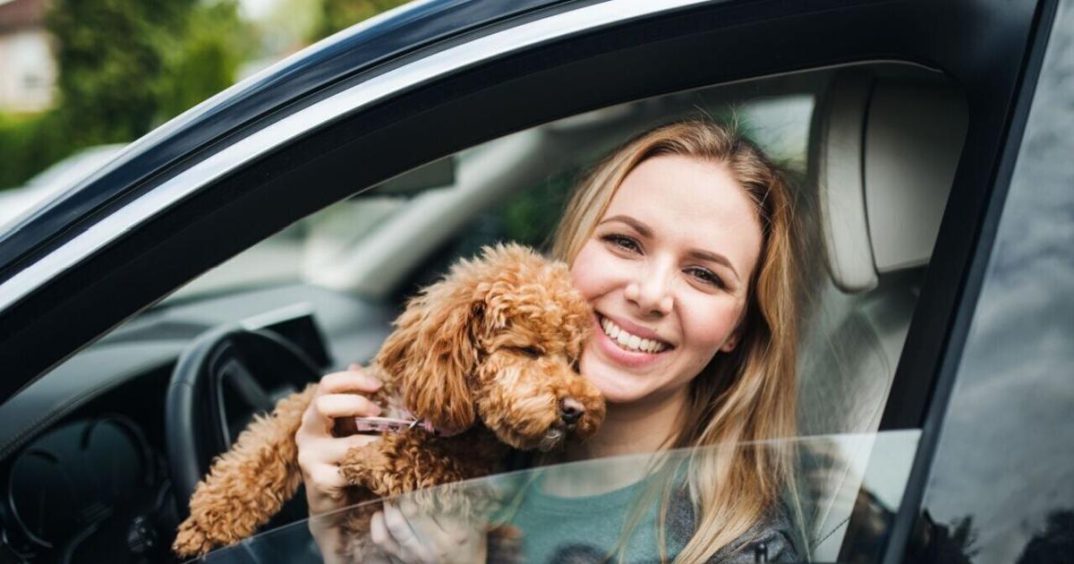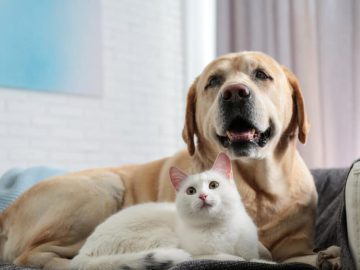According to a study by the American Pet Products Association, 66% of U.S. households own a pet. Of those 86.9 million households, 65.1 million own a dog, 46.5 million households own a cat, and 11.1 million households own a freshwater fish. In 1988, only 56% of American households had a pet.
Pet ownership has risen significantly in the United States over the past 30 years, especially during the pandemic. More Americans own dogs than any other pet, followed by cats, fish, birds, and other small animals.
Millennials comprise the largest percentage of pet owners, and a majority of them regard their pet of choice as a member of the family. Gen X clocks in with the second-highest percentage of pet owners as well as the generation most likely to have a variety of pets. Baby boomers comprise only 24% of current pet owners.
Amanda Kay of My Life, I Guess is a millennial who has four cat companions and prefers felines over dogs. “They are lower maintenance, for one,” says Kay about cats. “Plus we are in a rental property without a yard, so having a dog would be challenging.”
Adriana Copaceanu of Backyard Garden Lover is a baby boomer with several fowl friends. “Our chickens are definitely part of our family,” says Copaceanu. “We spend time with them daily — we let them free range only when we are present — and our daughter, a nurse, spends time with them after her 12-hour shifts in the ER. We all think they’re the cheapest and best therapy for whatever ails you.”
How Much Do Americans Spend on Pets?
Americans spent $136.8 billion on their pets in 2022, up from $123.6 billion in 2021. According to a OnePoll survey commissioned by USA Today, annual dog expenses in 2024 average around $376 a month or $4,512 a year. This includes the cost of adopting or purchasing the dog as well as ongoing annual expenses, like food, veterinary care, pet insurance, and boarding for vacations.
The American Veterinary Medical Association reports dog owners spend more annually ($912) than cat owners ($653) for food, vet care, toys, grooming, and other expenses. In addition, Forbes Advisor reports the five most-expensive U.S. cities to own a dog are:
- Winston-Salem, North Carolina
- Greensboro, North Carolina
- Bakersfield, California
- El Paso, Texas
- Memphis, Tennessee
No generation spoils their pets more than Gen Z. These young adults are most likely to spend money on birthday cakes, birthday presents, and costumes for their pets. They also open their wallets more than other generations for behavioral training, dog daycare, specialized pet food, and dog-walking services.
Dog Owners Have Regrets and Make Sacrifices
Just because dogs took the top spot as the most popular pet in America doesn’t mean that owning one is nothing but warm snuggles, leisurely strolls around the neighborhood, and unconditional love.
According to another Forbes Advisor survey of 2,000 dog owners, 54% say they had some regrets about getting a pooch. Twenty-seven percent of dog owners cited cleaning up after man’s best friend as the biggest challenge of dog ownership, followed by securing care for their dogs during work or travel (26%), dog training (25%), cost of dog and expenses (24%), and barking and whining (24%).
A separate Forbes Advisor study of 10,000 dog owners finds they made several professional, financial, and lifestyle sacrifices to welcome a canine companion into their homes.
- 39.29% had to tighten their budgets to pay for a dog and its care.
- 36% said they would pay $4,000 or more out of pocket for emergency medical care for their dogs.
- 13.96% moved from an apartment to a more expensive house so that their dog had access to a yard.
- 7.47% stayed at an undesirable job because it allowed them to work from home or had a dog-friendly office.
- 6.78% broke up with a partner who didn’t like their pooch.
- 5.25% took a pay cut or accepted a position with fewer benefits to work remotely or have access to a dog-friendly office.
- 4.57% left an otherwise satisfying job to take a less-desirable position at a company that offered remote work or dog-accommodating offices.
The Best States for Dog Ownership
Colorado tops the list of U.S. states with the most devoted dog owners, followed by Virginia, Georgia, Alaska, and Nevada. Pennsylvania came in dead last.
Florida is the state with the most-spoiled dogs, followed by Alaska, Washington, Colorado, and California. Factors that influenced this ranking include the percentage of surveyed owners who brought their dogs on vacation, prepared homemade dog food and treats, and pushed their dogs in strollers.
The Best U.S. Cities for Pet Owners
To determine the best cities in the U.S. for pet owners, Forbes Advisor considered factors such as the cost of vet care for both cats and dogs, access to veterinarians, and number of pet-friendly spaces offered by each city. The top U.S. cities for pet owners are:
- Kansas City, Missouri
- Nashville, Tennessee
- Albuquerque, New Mexico
- Raleigh, North Carolina
- Wichita, Kansas
Dogs and Cats Are Equally Beneficial for Mental Health
An American Psychiatric Association Healthy Minds Monthly Poll released jointly with the American Veterinary Medical Association finds many mental health benefits of pets.
In a similar study last year, 86% said their pets have a mostly positive impact on their mental health. Pets that are not cats or dogs fall a little lower on the scale.
“It’s easy to overlook the role of pets when we’re talking about mental health,” says APA President Petros Levounis, M.D., M.A. “But for people who do enjoy the company of animals, they can be a source of companionship, comfort, love, and friendship. I routinely encourage adoption of a pet to my patients who struggle with addiction to alcohol, drugs, or technology. We’re also starting to see more and more research around the role that animals can play in recovery from depression and other psychiatric disorders.”
Nearly two-thirds of pet owners say that their animals offer companionship (65%), are a true friend (65%) and provide unconditional love and support (64%).
“As veterinarians, we witness firsthand the powerful bond between people and their animals, and the positive impact pets can have on their emotional well-being,” shares AVMA President Rena Carlson, D.V.M. “From offering companionship and unconditional love to reducing stress and anxiety, pets can be invaluable sources of comfort and support. These survey results further reinforce the importance of responsible pet ownership and the critical role pets play in our lives.”
Dog owners were twice as likely as cat owners to say their pet encourages them to be physically active, which tracks since most dogs require walks.
“The benefits of pet ownership to many Americans seem to outweigh the stressors,” explains APA CEO and Medical Director Saul Levin, M.D., M.P.A. “If pets are not an option for your family, but you are seeking that connection, there are many opportunities to volunteer with animals that may also benefit your life.”




